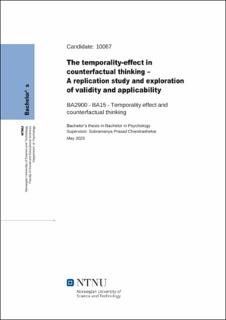| dc.contributor.advisor | Chandrashekar, Subramanya Prasad. | |
| dc.contributor.author | Eriksen, Jakob Lie. | |
| dc.date.accessioned | 2023-07-11T17:20:11Z | |
| dc.date.available | 2023-07-11T17:20:11Z | |
| dc.date.issued | 2023 | |
| dc.identifier | no.ntnu:inspera:146342237:69750558 | |
| dc.identifier.uri | https://hdl.handle.net/11250/3077770 | |
| dc.description.abstract | Kontrafaktisk tankegang og temporaleffekten er konsepter som har blitt studert hovedsaklig innenfor fagfeltet beslutningstakning. Det har vært noe uenighet rundt de teoretiske mekanismene som ligger bakenfor fenomenet, samt om temporaleffekten som begrep er den beste måten å beskrive fenomenet. Denne studien undersøkte temporaleffelten i kontrafaktisk tenkning ved å replikere to tidligere studier, gjennomført av forskere som har god farstid på fagfeltet. Det ble laget tre generelle hypoteser som var gjeldende for begge studiene. Disse er; H1: Den siste hendelsen i en sekvens med to uavhengige hendelser vurderes som mer naturlig å endre enn den første. H2: Gitt et negativt utfall basert på en sekvens med to uavhengige sjanse-hendelser, vil deltagerene vurdere at den andre spilleren opplever mer skyldfølelse enn den første spilleren. H3: Gitt ett negativt utfall basert på en sekvens med to uavhengige sjanse-hendelser, vil deltagerene vurdere at den første spilleren vil skylde på den andre spilleren oftere enn den andre spilleren skylder på den første. Resultatene fra begge studiene støtter samtlige av hypotesene. Alle resultatene fra de originale studiene replikerte også i replikasjonsstudiene sine resultater. Disse resultatene ble deretter diskutert i opp i mot andre bidrag til fagfeltet om kontrafaktisk tenkning og temporaleffekten, i tillegg til mulige andre felt der forskningen kan påføres, utenfor akademisk forskning. | |
| dc.description.abstract | Counterfactual thinking and the temporality effect are concepts that have been studied to a moderate extent mostly in the field of decision-making. There has been some disagreement on the theoretical mechanisms that establish the basis for the phenomena, as well as if the temporality effect is the best way to describe the phenomena. This study investigated the temporality effect in counterfactual thinking through replicating two previously performed studies by researchers that are well-fared in the field. Three general predictions that apply to both of the studies were made, which are; H1: The most recent event in a sequence of two independent events is considered more mutable than the first. H2: Given a negative outcome based on a sequence of two independent chance events, participants will judge the second player to experience more guilt than the first player. And lastly; H3: Given a negative outcome based on a sequence of two independent chance events, the study participants will judge that the first player will blame the second player more often than the second player blaming the first player. The results of the studies both supported all of the hypotheses. All of the original studies’ results also replicated in the replication studies and their respective results. These results are then discussed in relation to other contributions on the field of counterfactual thinking and the temporality effect, as well as possible fields of application outside of academical research. | |
| dc.language | eng | |
| dc.publisher | NTNU | |
| dc.title | The temporality-effect in counterfactual thinking – A replication study and exploration of validity and applicability | |
| dc.type | Bachelor thesis | |
